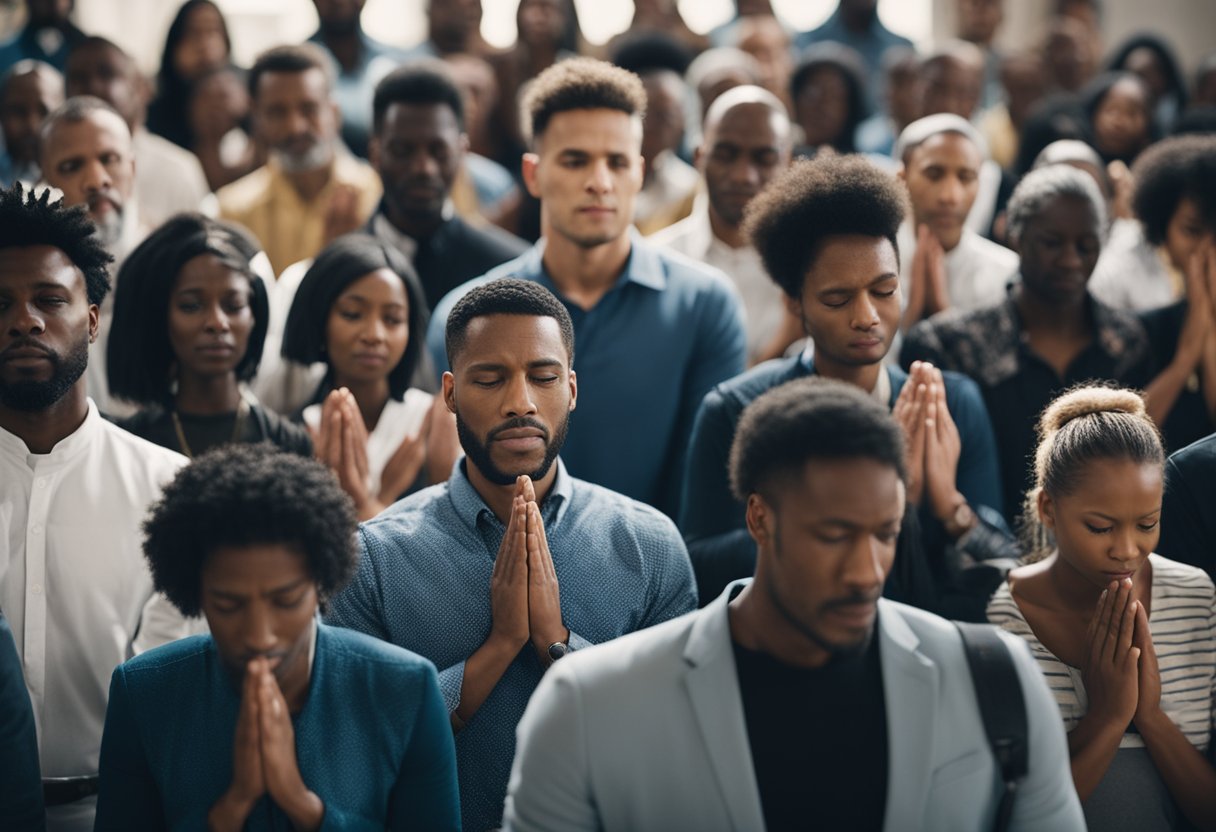As a nation founded on Christian principles, the United States of America has a long history of prayer and repentance in the name of Jesus. From the earliest days of European settlement to the present day, Americans have turned to prayer as a way to seek forgiveness and hear from heaven for God’s guidance, and healing from heaven. In recent years, there has been a growing calls for America’s prayer of repentance.
The Call for National Repentance is a movement that seeks to bring Americans together in prayer and repentance. The goal is to acknowledge the sins of the past and present, seek forgiveness, and ask for God’s guidance and healing. This call is not limited to any particular denomination or group but is open to all who seek to turn to God in repentance with a contrite heart.
Key Takeaways
- America has a long history of prayer and repentance, calling upon the name of Jesus for guidance.
- The Call for National Repentance is a movement that seeks to bring Americans together in prayer and repentance.
- This call is not limited to any particular denomination or group but is open to all who seek to turn to God in repentance.
The Call for National Repentance

As a nation, we have experienced both triumphs and failures. We have seen times of great prosperity and times of deep sorrow. In the face of adversity, we have come together to pray for strength and guidance. At times, we have also come together to seek forgiveness and repentance for our sins.
Historical Context of America’s Prayer of Repentance
National repentance has been a part of American history since its founding. In times of crisis, leaders have called on citizens to come together and seek forgiveness for their sins under the command of the Lord God. One notable example is President Abraham Lincoln’s call for a day of national repentance and prayer during the Civil War.
The Role of Faith Leaders and National Events
Faith leaders, acknowledging our sinful nature, have played a crucial role in calling for national repentance. Reverend Billy Graham, for example, held many national events where he preached about the importance of repentance and forgiveness in the nameof Jesus, our Savior. His son, Franklin Graham, continues this legacy today.
As a nation, we must continue to come together in times of crisis and seek forgiveness for our sins. We must also strive to live our lives in a way that honors God and reflects His love and grace. Let us continue to pray for our nation and seek His guidance in all that we do.
Spiritual Foundations of Repentance

Repentance is a vital aspect of our spiritual journey, and it is essential that we understand its spiritual foundations. In this section, we will explore the biblical teachings on repentance, the power of prayer and forgiveness, and how they relate to our faith.
Biblical Teachings on Repentance
The Bible teaches that repentance is a turning away from sin and turning towards God our savior. In 2 Chronicles 7:14, God promises to heal our land if we humble ourselves, pray, seek His face, and turn from our wicked ways. Repentance is a necessary step in our journey towards salvation and eternal life.
Jesus Christ also emphasized the importance of repentance during His ministry on earth. In Luke 13:3, He said, “Unless you repent, you too will all perish.” Repentance is not just a one-time event but a continual process of turning away from sin and towards God.
The Power of Prayer and Forgiveness
Prayer is a powerful tool that we can use to connect with God and seek His forgiveness. We can pray for ourselves and others, asking for forgiveness and strength to overcome sin. The Holy Spirit also intercedes on our behalf, helping us to pray when we do not know what to say.
Forgiveness is also a crucial aspect of repentance. We must forgive others as God has forgiven us. In Matthew 6:14-15, Jesus said, “For if you forgive other people when they sin against you, your heavenly Father will also forgive you. But if you do not forgive others their sins, your Father will not forgive your sins.” Forgiveness is not always easy, but it is necessary for our spiritual growth and well-being.
In conclusion, repentance, prayer, and forgiveness are essential spiritual foundations that we must understand and apply in our lives. By turning away from sin, seeking God’s forgiveness through prayer, and forgiving others, we can grow in our faith and draw closer to God.
Healing Through Repentance
When we face a crisis, whether personal or national, it is easy to feel overwhelmed and alone. We may struggle with feelings of grief, hopelessness, or fear. However, as we turn to God and seek His guidance, we can find healing, hope, and strength through repentance.
Personal Transformation
Repentance is not just about confessing our sins and asking for forgiveness. It is about turning away from our old ways and committing to a new path. Through repentance, we can experience a personal transformation that brings us closer to God and helps us become the person He created us to be.
As we repent, we can let go of the burdens of guilt and shame and embrace the healing power of God’s love. We can find hope in His promises and strength in His grace. By turning to Him in prayer and studying His word, we can deepen our faith and grow in our relationship with Him.
Community and National Healing
Repentance is not just a personal experience. It is also a tool for healing our communities and our nation. As we come together in repentance, we can find unity and strength in our shared faith. We can support one another through our struggles and work together to create a better future.
Through repentance, we can also address the cultural and societal issues that contribute to our struggles. We can seek forgiveness for the ways we have hurt others and work to create a more just and loving society. By turning to God and following His guidance, we can find healing and hope for ourselves, our families, and our communities.
In conclusion, repentance is a powerful tool for healing and transformation. By turning to God in prayer and seeking His guidance, we can find hope, strength, and unity in the face of adversity. Let us embrace the power of repentance and work together to create a better future for ourselves and our world.
Living Out Repentance
Living out repentance is a continual process that requires humility, service, restoration, virtue, passion, witness, giving, and spirituality. As we seek to live out our faith, we are called to serve those around us and restore relationships that have been broken. Through acts of service and restoration, we can show the love of Christ to those in need.
Acts of Service and Restoration
One way to live out repentance is through acts of service and restoration. By serving others, we can show the love of Christ and restore relationships that have been broken. This can be done through volunteering at local charities, helping out at church events, or simply reaching out to those in need. We can also restore relationships by seeking forgiveness and offering forgiveness to those who have wronged us.
Continuing the Journey of Faith
Living out repentance is a lifelong journey of faith. As we continue on this journey, we must remain passionate about our faith and dedicated to living a life that is pleasing to God. This requires us to be intentional about our spiritual growth, seeking out opportunities to deepen our relationship with Christ and to share our faith with others.
We can also give back to our community by supporting local charities and organizations that align with our values. By giving of our time, talents, and resources, we can make a positive impact on those around us and show the love of Christ in tangible ways.
In conclusion, living out repentance is a continual process that requires us to be intentional about our spiritual growth and dedicated to serving others. By living a life of humility, service, restoration, virtue, passion, witness, giving, and spirituality, we can show the love of Christ to those around us and make a positive impact on our community.
Frequently Asked Questions
How can we craft a prayer of repentance that reflects our nation’s collective desire for forgiveness?
Crafting a prayer of repentance for our nation requires us to first acknowledge our sins and seek forgiveness from God. We can begin by praying for a spirit of humility and contrition, recognizing that we have fallen short of God’s standard and that we need His mercy and grace. We can also ask the Holy Spirit to guide us in our prayers, so that we may pray in accordance with God’s will.
Which Bible verses can guide us in interceding for our country’s spiritual renewal?
The Bible is rich with verses that can guide us in interceding for our country’s spiritual renewal. We can look to passages like 2 Chronicles 7:14, which calls us to humble ourselves, pray, seek God’s face, and turn from our wicked ways. We can also draw inspiration from verses like Psalm 51:10, which asks God to create in us a clean heart and renew a right spirit within us. Other verses that may be helpful include Isaiah 58:6-9, Jeremiah 29:7, and Matthew 5:13-16.
In what ways can we incorporate prayers of repentance into our communal worship and personal devotions?
We can incorporate prayers of repentance into our communal worship and personal devotions in a variety of ways. We can begin by setting aside time each day to pray for our nation and its leaders, asking God to guide them and to bring about spiritual renewal. We can also incorporate prayers of repentance into our church services, either through corporate prayers or by inviting members of the congregation to share their own prayers of repentance. Additionally, we can use resources like prayer journals or devotionals to guide our personal prayer time.
What are effective prayer points to include when seeking national healing and spiritual restoration?
Effective prayer points for seeking national healing and spiritual restoration may include asking God to bring about repentance and revival in our nation, praying for our leaders and government officials, and asking God to heal the wounds of division and strife that exist in our society. We may also pray for the Church to be a shining light of hope and love in our communities, and for God to use us as instruments of His peace and reconciliation.
How can we as individuals contribute to a national movement of repentance and reconciliation?
As individuals, we can contribute to a national movement of repentance and reconciliation by first examining our own hearts and seeking to live lives that are pleasing to God. We can also engage in acts of service and love that promote unity and healing in our communities, and by speaking out against injustice and oppression. Additionally, we can pray for our nation and its leaders, and ask God to use us as agents of His love and grace.
What examples from scripture demonstrate the power of repentance in transforming societies?
Scripture is replete with examples of the power of repentance in transforming societies. The story of Nineveh in the book of Jonah, for example, illustrates how a city can be transformed through collective repentance and turning towards God. The story of the prodigal son in Luke 15 also demonstrates the transformative power of repentance on an individual level, as the son returns to his father and experiences forgiveness and restoration. Other examples include the conversion of Saul in Acts 9, and the story of the woman at the well in John 4.

